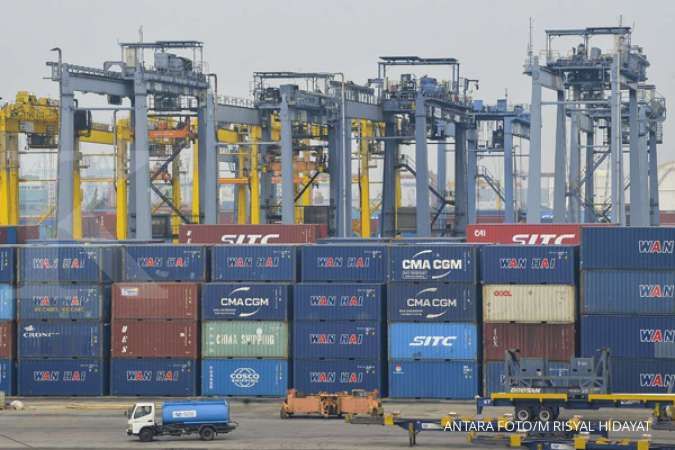Judul : Trump Still Imposes 32% Tariff on Imports from Indonesia, Here's What the Economist Says
link : Trump Still Imposes 32% Tariff on Imports from Indonesia, Here's What the Economist Says
Trump Still Imposes 32% Tariff on Imports from Indonesia, Here's What the Economist Says

Best for you.CO.ID – JAKARTA. US President Donald Trump will continue to impose a 32% import tariff on all Indonesian products starting August 1, 2025. This has made the efforts of the Indonesian delegation's negotiation regarding the US trade policy tariffs considered a failure.
Economist and Public Policy Expert from UPN Veteran Jakarta, Achmad Nur Hidayat stated that the government's claim that negotiations are intensive means nothing when the final result is nil.
"Indonesia still faces high tariffs, while neighboring countries such as Thailand and Cambodia have successfully reduced their tariff burdens from initially 36% and 49% to 10%," said Acmad in a written statement on Tuesday (7/8).
In his view, this situation is not merely a technical failure, but a failure of leadership by Airlangga Hartarto and Sri Mulyani Indrawati and their group in defending the strategic interests of the Indonesian people.
She said, this 32% tariff is like putting a big stone on the feet of an athlete about to run in a global competition. Indonesia's leading products such as textiles, footwear, furniture, and agro-manufactured products will directly lose their competitiveness in the U.S. market.
"In international trade, a five percent margin difference can shift a purchase contract to another country. Especially if the tariff difference reaches 32%. It's like an athlete who has to run against other runners with a backpack full of stones on their back," he said.
Acmad assessed that the failure of this negotiation also occurred because the Indonesian negotiation team did not have an oriented strategy. The government only relied on the intensity of formal meetings without preparing a trade diplomacy roadmap based on national interests and Trump's policy preferences.
Negotiation Mistake: Waiting for American Mercy
Trump's official letter clearly states that tariffs can be changed if Indonesia makes trade policy adjustments and opens the national market to American products.
According to Achmad, this is transactional diplomacy, a negotiation strategy commonly used in global trade relations. However, the Indonesian government is seen as not being prepared. counter-offer worthy
"Indonesia is waiting for American compassion without offering a reciprocal policy that provides strategic value for Indonesia," he explained.
As for the glaring mistakes, it is the failure to utilize the very strategic bargaining power, the mineral processing of important minerals such as nickel.
Indonesia holds about 34% of the world's nickel reserves, this should be bargaining chip Strong and becoming a potential focal point in tariff negotiations.
However, ironically, the Indonesian team is considered unable to formulate concrete offers, such as downstream investment or technical concession related to critical minerals that would encourage the US to lower tariffs because it needs nickel supply for the electric vehicle and military industries.
Moreover, domestic regulatory issues, particularly slow bureaucracy, legal uncertainty, and Domestic Component Level barriers, also constitute a burden that makes the US hesitant to lower tariffs.
Another negotiation mistake, the burden of our diplomatic strategy, the position of the Indonesian Ambassador to the United States has been vacant for almost two years, since Rosan Roeslani left her position on July 17, 2023.
The current government has not yet appointed a successor, although the US is Indonesia's main trade and strategic partner.
Without official representation in Washington DC, Indonesia's voice is not optimally represented in tariff diplomacy, strategic negotiations become weaker and less responsive, as there is no ambassador with full authority to open dialogue, submit concrete proposals, or mediate the interests of nickel and mineral localization, if any, there is none. continuity in diplomacy.
"This void is not just negligence, but it lowers Indonesia's bargaining position on the global stage," he emphasized.
Previously, US President Donald J. Trump officially sent a letter to Indonesian Republic President Prabowo Subianto, containing a strong statement regarding the trade imbalance between the two countries.
In the letter, Trump emphasized that all Indonesian products entering the US will be subject to an additional 32% tariff starting August 1, 2025, in addition to existing sectoral tariffs.
A formal letter with the White House letterhead, signed directly by Trump, was uploaded through his social media account on Tuesday (7/8).
In his letter, Trump stated that the US-Indonesia trade relationship has been "far from reciprocal" and harmful to the US economy.
"Over the years, Indonesia has implemented various trade policies that have created a very large and ongoing deficit for the United States," wrote Trump.
She stated that the 32% tariff did not yet reflect the magnitude of the trade imbalance, but was considered a fair initial step.
Tariff will also be applied to re-exported goods ( transshipment ) that tries to avoid high import duties.
Nevertheless, Trump still left room for negotiation. He stated that additional tariffs could be canceled if Indonesia or Indonesian companies were willing to build production facilities in the US.
Demikianlah Artikel Trump Still Imposes 32% Tariff on Imports from Indonesia, Here's What the Economist Says
Anda sekarang membaca artikel Trump Still Imposes 32% Tariff on Imports from Indonesia, Here's What the Economist Says dengan alamat link https://www.punyakamu.com/2025/07/trump-still-imposes-32-tariff-on.html
0 Response to "Trump Still Imposes 32% Tariff on Imports from Indonesia, Here's What the Economist Says"
Post a Comment